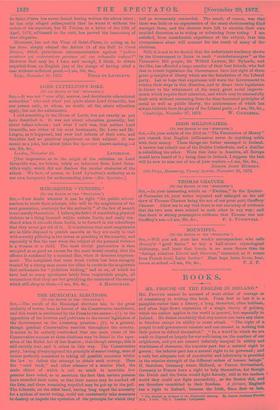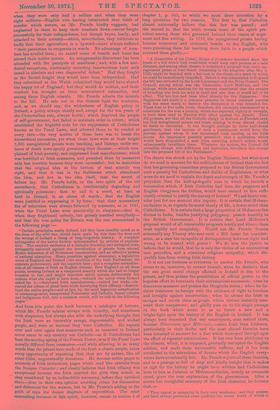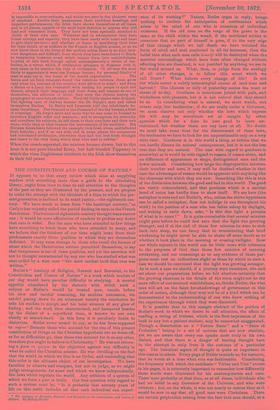BOOKS.
MR. FROUDE ON TIIE ENGLISH IN IRELAND.* Mn. FROUDE cannot be accused of want either of courage or- of consistency in writing this book. From first to last it is &- pamphlet rather than a history, a long, rhetorical, often brilliant,. and often high-flown expression of a single theory of politics, which the author applies to the world in general, but especially to Ireland. He denies absolutely that any nation can have any claim to freedom except its ability to resist attack. "The right of a. people to self-government consists and can consist in nothing but their power to defend themselves." "In a worldin which we are made to depend so largely for our well-being on the conduct of our neighbours, and yet are created infinitely unequal in ability and worthiness of character, the superior part has a natural right to govern ; the inferior part has a natural right to be governed ; and a rude but adequate test of superiority and inferiority is provided in the relative strength of the different orders of human beings." If, therefore, Germany wants Holland, or France Switzerland, Germany or France have a right to help themselves, for though the Dutch and the Swiss would fight fiercely, still in the modern world they could not fight successfully, as the Scotch did, and are therefore unentitled to their freedom. A fortiori, England has a right to Ireland, because the Irish, from first to last, * The English in Ireland in the Eighteenth Century. By James Anthony Fronde M.A. 2 vols. Vol. L London: Lour:dams.
when they were only half a million and when they were eight millions—English rule having terminated that habit of murder which nature, as Mr. Fronde kindly suggests, had implanted in them to keep their numbers down—never fought -successfully for their independence, but though brave, hardy, and attached to their country—which, nevertheless, they cultivate so badly that their agriculture is a byword—have always suffered " their patriotism to evaporate in words. No advantage of num- bers has availed them ; no sacred sense of hearth and home has stirred their nobler nature. An unappeasable discontent has been
attended with the paralysis of manliness ; and, with a few acci- dental exceptions, continually recurring insurrections have only
issued in absolute and ever disgraceful defeat." Had they fought as the Scotch fought they would have been independent. Had they submitted as the Welsh submitted they would have shared the happy lot of England; but they would do neither, and their conduct has brought on them unnumbered calamities, and among them English misrule. Mr. Froude admits the misrule to the full. He sets out in the clearest light the weakness, and, as we should say, the wickedness of English policy in Ireland, a policy always bloody and, except for the ten years of the Cromwellian rule, always feeble ; which deprived the people of self-government, but failed to maintain order in return ; which established the frightful code for the suppression of Catholicism known as the Penal Laws, and allowed them to be evaded at every turn—the very motive of those laws was to break the hierarchical succession, yet when those laws were at their height 3,000 unregistered priests were teaching, and bishops under sen- tence of death were openly governing their dioceses ;—which com- plained of Irish poverty, and suppressed Irish manufactures; which was horrified at Irish massacres, and punished them by massacres only less horrible because they were successful ; but he maintains that the original idea at the bottom of that misrule was right, and that it was in the feebleness which abandoned the idea, and not in the idea itself, that the secret of failure lay. Mr. Fronde holds, in the true spirit of the old ascendancy, that Catholicism is intellectually degrading and spiritually poisonous ; that to call it a creed, at least as held in Ireland, is an abuse of words ; that the English were justified in suppressing it by force ; that their momentary fits of toleration were always followed by massacre, as in 1641, when the Penal Laws were practically in abeyance—that is, when they frightened nobody, but grossly insulted everybody— and that the true policy for Britain was the one summarised in the following page :-
° Certain principles, easily defined, had they been steadily acted on at the close of the civil war, would have made by this time the woes and the wrongs of Ireland a thing of long-forgotten history. A complete subjugation of the native faction untrammelled by articles of capitula- tion. The resolute exclusion of a Catholic hierachy, and stringent laws, stringently enforced, against the introduction of priests from abroad. Entire toleration of all Protestant communities, and an effective system of national education. Sharp penalties against absentees ; a legislative union of England and Ireland ; the abolition of the Irish Parliament, the separate government, and the separate bars ; and a complete naturaliza- tion of all classes of Irish as English citizens. How England on all these points, treating Ireland as a conquered country which she had no longer occasion to fear, and might therefore safely misuse, deliberately left undone what aho ought to have done,—refused the union when Ireland asked for it,—destroyed Irish manufactures,—ruined her trade,—in- curred the odium of penal laws while destroying their efficacy—demora- lized the entire people—and at last, by the most ingenious complication of mismanagement, exasperated Protestant and Catholic, Saxon colonist and indigenous Celt, into a common revolt, will be told in the following pages."
And from this point the book becomes a catalogue of horrors, which Mr. Froude relates always with vivacity, and sometimes with eloquence, but always also with the underlying thought that the Irish were an incurably savage, ungovernable, and wicked people, and were so because they were Catholics. He repeats over and over again that massacres such as occurred in Ireland never occur in any country not Catholic—as if Catholicism had been the moving spring of the French Terror, or as if the Penal Laws morally differed from massacres—and while allowing in so many words that the priests have made of the Irish a chaste people, takes every opportunity of repeating that they are by nature, like all
other Celts, ungovernably licentious. He devotes entire pages to accounts of Irish abductions, pages which read like extracts from the Netvgate Calendar; and clearly believes that Irish villainy was exceptional because the Irish married the girls they seized, as -they considered by an indissoluble ceremony, before they ravished them—thus in their own opinion avoiding crime for themselves ' and dishonour for the women, but in Mr. Froude's adding to the guilt of rape the deeper disgrace of superstition. The most
astounding instance of this spirit, however, occurs in section 4 of
chapter 1, p. 545, to which we must draw attention by a long quotation for two reasons. The first is, that Catholics almost universally believe that this law was passed ; and the second is, that the truth reveals more of the spirit pre- valent among those who governed Ireland than reams of argu- ment and fine writing. In 1719, the unregistered priests having
become numerous and extremely hostile to the English, who were punishing them for teaching their faith to a people which received them gladly,—
" A. Committee of the [Irish] House of Co mmons therefore drew the heads of a bill which they considered would keep such persons at a safe distance, and among other clauses it contained a proposal that every un- registered priest or friar found remaining in the kingdom after May 1, 1720, might be branded with a hot iron in the cheek, ass mark by which he could be immediately identified. Before it was transmitted to England the bill was reviewed by the Lord-Lieutonant and the Privy Council. The Council, among whom was the Chanceller, Lord Midleton, and two bishops, while most anxious for its success, considered that the penalty of branding was both too mild in itself and also that it would fail of its effect. The hot iron had been tried already for the Rapparees : ' the Rapparoes had made it a common practice to brand innocent persons with the same mark, to destroy the distinction it was intended for. These four or five noble lords, therefore, did certainly recommend as a substitute for the iron a penalty, which was reported, rightly or wrongly, to have been used in Sweden with effect against the Jesuits. They did propose, not that all the Catholic clergy in Ireland, as Plowden says, but that unregistered priests and friars coming in from abroad should be liable to castration. It was thought perhaps by those half-dozen gentlemen, that the horrors of such a punishment would keep the persons against whom it was threatened from landing on the Irish shores. An impression possibly prevailed that a mutilation which would have disqualified a man from receiving priest's orders would subsequently invalidate them. Whatever the motive, the Council did certainly, though with diffidence and hesitation, introduce this change into the proposed bill of the Parliament."
The clause was struck out by the English Ministry, but what more do we need to account for the seditiousness of Ireland than the fact that her governing committee proposed to the British Government such a penalty for Catholicism and dislike of Englishmen, or what
more do we need to explain the depth and strength of Mr. Froude's prejudice than the half-apologetic tone in which he records a transaction which, if Irish Catholics had been the proposers and English clergymen the victims, would have seemed to him suffi-
ciently criminal to justify the slavery of Ireland? We ask him to con- sider just for one moment this inquiry. It is certain that Moham- medanism is, as regards its moral theory of life, a lower creed than Catholicism. It is certain that a large proportion of Mohammedan divines in India, besides justifying polygamy, preach hostility to the British Government. It is certain that Lord Midleton's proposal would of all conceivable proposals terrify and silence them most rapidly and completely. Would not Mr. Fronde 'dismiss summarily any Viceroy who sent such a Bill home for consider- ation, as a man too incapable of distinguishing between right and wrong to be trusted with power ? We do him the justice to believe that he would, that he is only the victim of an unconscious race prejudice, and a conscious religious antipathy, which dis- qualify him from writing Irish history.
It is not our business as reviewers to answer Mr. Fronde, who seems to us, moreover, to answer himself, when he declares that the one great moral change effected in Ireland is due to the priests, and then praises the prostitution of official power to the hopeless effort to terminate their ecclesiastical succession; when he denounces massacre and praises the Drogheda storm ; when he de- clares resistance to foreign rule the evidence of right to freedom and inveigles against insurrection ; when he abuses the lrish as savages and extols them as people whose virtues instantly mas- tered their conquerors ; and gladly pass on to the single passage in the book which seems to us to throw a new and a bright light upon the history of the English in Ireland. It has always been remarked that our countrymen, once settled there, become Hiberniores ipsis Hibernici,—more Irish than Irishmen, particularly in their faults, and the most absurd theories have been invented to account for a fact which destroyed through ages the effect of repeated colonisations. It has ever been attributed to the climate, which, it is supposed, gradually corrupted the English settlers, and made them untameable ruffians, and it has been attributed to the attractions of licence which the English every- where have occasionally felt. Mr. Froude rejects all these theories, and in a passage so full of deep and kindly insight that it makes us sigh for the history he might have written had Catholicism
been to him as Judaism or Mohammedanism, merely an erroneous creed, gives the true explanation of the phenomenon. After a
severe but thoughtful summary of the Irish character, he declares that,—
" They appeal to sympathy in their very weakness ; and they possess and have always possessed some qualities the moral worth of which it is impossible to over-estimate, and which are rare in the choicest races of mankind. Amidst their weaknesses, their confident boastings and imperfect performances, the Irish have shown themselves at all times, and in all places, capable of the most loyal devotion to anyone who will lead and command them. They have not been specially attached to chiefs of their own race. Wherever and in whomsoever they have found courage and capacity, they have been ready with heart and hand to give their services; and whether at home in sacrificing their lives for their chiefs, or as soldiers in the French or English armies, or as we now know them in the form of the modern police, there is no duty, how- ever dangerous and difficult, from which they have been found to flinch, no temptation however cruel which tempts them into unfaithfulness. Loyalty of this kind, though called contemptuously a virtue of bar- barism, is a virtue which, if civilisation attempts to dispense with it, may cause in its absence the ruin of civilisation. Of all men the meet likely to appreciate it were the Norman barons; for personal fidelity of man to man lay at tho heart of the feudal organisation The baron and his Irish retainers found the relations between them grow easy when the customs of the country were allowed to stand ; and when a Butler or a Lacy, not contented with leading his people to spoil and victory, adopted their language and their dress, and became as one of themselves, the affection of which they wore the objects among the people grew at once into adoration. Then old Celtic names were dropped. The fighting men of Galway became the Da Burgh's men and called themselves Burkes. In Kerry and Limerick half the inhabitants be- came Geraldines. The Ormond or the Desmond of the day became a kind of sovereign. He forgot more and more that he was come to Ireland to introduce English order and manners ; and to strengthen his authority and conciliate his subjects, he left them to their own laws and their own ways, while they in turn became the instruments of his ambition. His Norman dependents followed the example, took Irish wives, and followed Irish fashions ; and if on one side, and in some places, the conquerors had introduced civilisation, elsewhere they had but lent fresh strength and sinew to the very thing which they were sent to subdue."
When the creeds separated, the mixture became slower, but to this hour it is not pure-blooded Kerry, but half-blooded Tipperary in which the vices Englishmen attribute to the Irish show themselves in their full power.




































 Previous page
Previous page